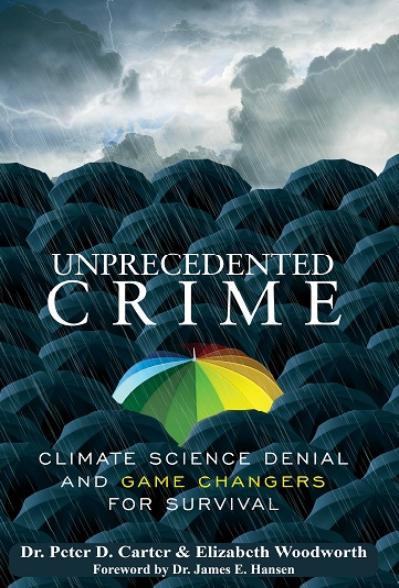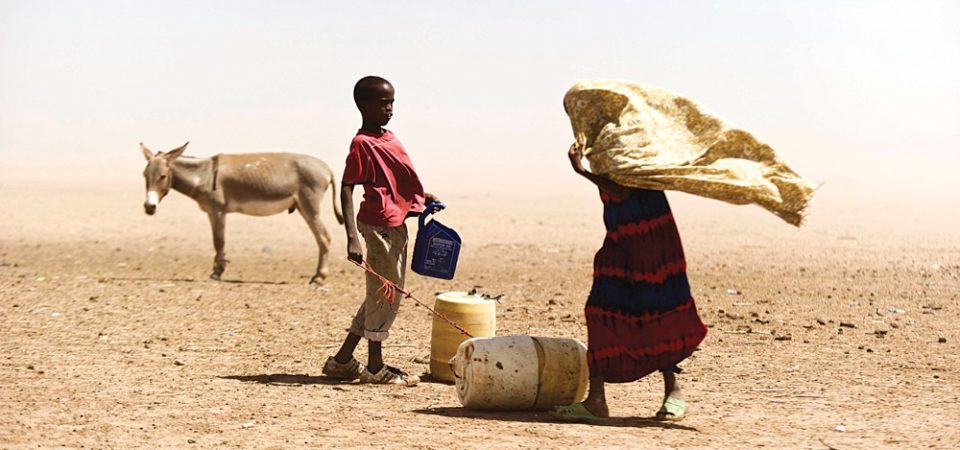This review was first published by Resilience.org on February 16, 2018. The original article can be found here. It is republished with permission from the author.

Seldom are missed books truly missed opportunities — but nothing could possibly be worse than missing an opportunity that could have saved your life, and those of your family and friends.
Unprecedented Crime: Climate Science Denial And Game Changers For Survival is just such a book that you shouldn’t miss in this increasingly post-truth age. With chapter-after-chapter gut punch, it is a volume that reads like a UN science team jointly making a life-and-death 911 call recording to a planet of primed and waiting emergency responders: “We’ve hit bottom. The situation is dire. Time is short. Ignore the criminal deniers, bankers, media and politicians! We need to urgently mobilize millions now!”
In a time when common sense human survival is really becoming uncommon with worsening existential threats in the White House and in our atmosphere and oceans with each passing hour, British Columbia writers Dr. Peter Carter and Elizabeth Woodworth, as honest brokers of factual scientific information, expose for readers the moral and intellectual bankruptcy of Big Oil glory days and their approaching end of days. Dr. James Hansen (the former NASA scientist, pioneering climate-prophet) provides a Foreword that is sure to give you the first twists and turns between nightmares and hope to be found in the book.
While arguably the most urgent issue of our time, climate change makes for a poor villain. It is impersonal, and usually glacially slow. However, there are uber-rich, faceless corporate villains lurking behind the rise in planet temperature who strive to ensure we all, in varying degrees, are part of the problem, by keeping the planet fossil-addicted. Such corporate crime stirs the moral outrage of the authors like a legion of Nazis bent on similar world domination once stirred our grandparents.
Unprecedented Crime devotes the opening half of the book to deftly arguing that climate denial is not just immoral, that it is a willful act of global-scale violence, an unimaginably senseless and cruel act of climate battery against today’s vulnerable, and dispossessed, a fate which will surely only deepen and become dire for today’s youth and future generations. It is a ‘policy breakout’ book deserving to be prominently placed on multiple library shelves from public health to climate adaptation to corporate criminology.
The writers chronicle how the billionaire-funded, but small denier community, has created an abrupt, near-death global experience, a life flashing before your eyes kind of thing, for the many facing record-shattering tornado swarms and hurricane force winds, to those barely escaping wildfire infernos with the clothes on their backs, and the palpably imaginable fear of others in flood-ravaged regions awaiting rescue from rooftops. The trauma of denial was only less immediate but sadly gravely under-reported for drought-stricken subsistence farmers in many developing nations watching their crops shrivel and die during intense heatwaves, and poor fishers experiencing the slow asphyxiation of fish in warming oceans and disappearing lakes. The fate of European climate refugees has become today’s fate of millions, human and non-human species seeking more and more migration to safe havens from deadly climate disruptions, habitat loss, and the conflicts which inevitably arise when resource scarcity becomes more acute on a hot planet.
While the definition of evil may change over time, as most governing parties anywhere in the world refuse to prohibit extraction of the oil and gas on their doorstep or fossil fuel imports due to the climate trivialization work of deniers and hydrocarbon-trafficking lobbyists, the authors ‘name and shame’ the deniers (and aiding and abetting bankers, media, shareholders and politicians) as among the evilest, downright dirty, and irredeemable corporate villains in the history of humanity.
Carter and Woodworth forcefully argue that it’s time for Big Oil ‘take-the-money and-run’ psychopaths to take full responsibility for the devastation they have wrought and to start paying for the unwise, unnecessary and unwanted global damage they have done and the moral confusion they have profitably cultivated. Only a fool keeps on appealing to the better nature of a deaf thug, hence Carter and Woodsworth do not expect much more than the expected ongoing manufactured rage and lies of deniers, and the betrayal and treason of the political establishment, and reserve the remainder of their book to ‘game changers’ who have demonstrated the courage and prescience to pull the emergency brake on the runaway climate train, and offer additional solutions that can help democratize survival for the many.
To that end, these climate crimefighting authors controversially support the creativity, gumption and grit of greater civil unrest and civil disobedience necessary to get reticent world leaders and their citizenry to urgently respond to the Paris Climate Accord 1.5 C guardrail dying of Trump’s toxic political malabsorption, and Canada’s Trudeau threatening genocidal relapse into genteel apartheid for non-consenting indigenous communities confronting the tarsands and new pipelines. Rest assured, history is not going to judge these leaders well.
Again, the real crime and legacy of unutterable shame is corporate and elected deniers suggesting indigenous and settler water protectors in our slowly decolonizing world commit a crime opposing new fossil fuel expansion (or the authors do by exposing planetary corporate ecocide and calling for concerted resistance, instead of rightfully receiving a civil courage award for their book).
Changing lifelong loyalties and habits is never easy, (especially if we’re still locked into a vexingly circular ‘glass half-full or half-empty of bitumen’ climate debate; as it turns out this shale bitumen barrel has no bottom) but is necessary if we want to have a habitable world for our gravely at-risk children and grandchildren.
Final takeaway for our ecologically ticking time bomb: If you’re feeling sadness or fury at the state of the world, the authors say put it to good use! A no compromise, no retreat, no surrender, global climate mobilization is just what the doctor ordered. This is not your first nor likely your final warning, but it is unerringly the most urgent in publication today — with very little time remaining.
Don’t wait for the final courtroom impact statements or climate collapse documentary. Read the book before the climate denier bully mob have it banned and burned (but don’t be surprised, if half way through, it makes you want to go out and blow up a pipeline).
If read, the smart money is on you — making a difference that matters — a difference that won’t cultivate the denier lie that the climate emergency is a hoax (but hey, pro wrestling is real), and that there will always be someone else to save the world. All readers of Unprecedented Crime should now consider yourselves ‘deputized’ to pursue by any means the lawlessness of carbon racketeers hiding in plain sight behind the autocratic corporate state.
If the law is to ensure human survival, everyday citizens must become the new vanguard pressing for a fundamentally just, democratic system change. Replacing complicity with conscience, together, we can again be both society’s sentinels and its tribunes.
This review was first published by Resilience.org on February 16, 2018. The original article can be found here. It is republished with permission from the author.
Howard Breen is a Victoria, B.C.-based writer and climate activist.
Unprecedented Crime is available for purchase through Clarity Press and Amazon.com, or can be found at a bookstore near you through InideBound.
The MAHB Blog is a venture of the Millennium Alliance for Humanity and the Biosphere. Questions should be directed to joan@mahbonline.org
MAHB Blog: https://mahb.stanford.edu/blog/unprecedented-crime-review/
The views and opinions expressed through the MAHB Website are those of the contributing authors and do not necessarily reflect an official position of the MAHB. The MAHB aims to share a range of perspectives and welcomes the discussions that they prompt.
